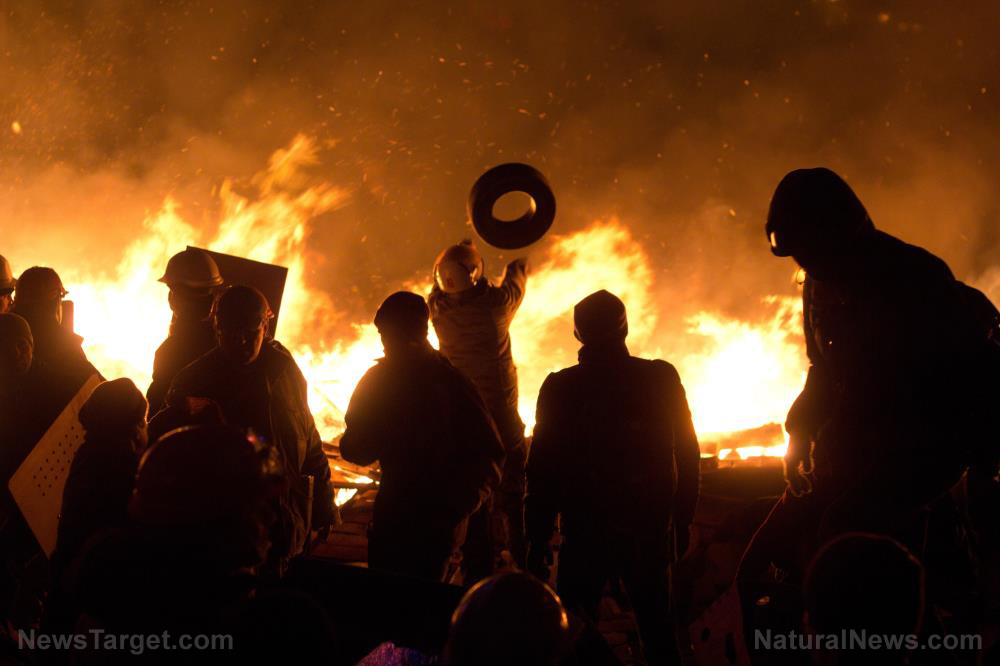
Advertisement
As the coronavirus ravages northern Italy, the country’s economically stagnant south is teetering on the edge of anarchy. Law enforcement personnel are worried that widespread rioting and looting can erupt if the government doesn’t get its act together quickly. In particular, the island of Sicily, Italy’s southernmost region, is turning into a powder keg.
Police have been deployed in droves in the regional capital of Palermo due to reports that gangs are ramping up activity by using social media to plan future attacks on stores. One such group on Facebook called National Revolution, which has about 2,600 members, is urging their group members to not pay for their grocery store purchases. Palermo’s supermarkets have seen an increased police presence as a result of one such raid.
On Monday, Tirrenia CIN, a ferry company that has been delivering vital goods to Sicily, the western island region of Sardinia and other minor islands, halted its services due to financial difficulties. This will potentially make matters worse as food supplies run low. Italian Prime Minister Giuseppe Conte said in a statement that the government will find a way to ensure that vital goods continue to be delivered.
As the Italian government creaks under the strain of the COVID-19 pandemic, officials are worried that the Italian mafia and other underground elements are preparing to take over.
Authorities are taking this threat so seriously that the government is making distribution of aid to the country’s underdeveloped southern regions a top priority.
“We need to act fast, more than fast,” said Leoluca Orlando, mayor of Palermo, Sicily. “Distress could turn into violence.”
Italian government preparing to provide billions in aid to the south
On March 10, Conte’s government unveiled an aid package of over 25 billion euros (around $27.5 billion) designed to protect workers and businesses during the pandemic. He is currently trying to channel some of those aid funds toward the Italian south. Over the weekend, he moved 4.3 billion euros from a “solidarity fund” to help municipalities cope with the lost revenue. He also added 400 million euros that mayors can convert into coupons for groceries. “No one will be left behind,” said Conte in a televised address.
But southern leaders are saying that this still isn’t enough. The aid from the solidarity fund, they claim, won’t be enough to save the economy of Southern Italy from breaking down. According to research group Prometeia, economic output is set to shrink by as much as 6.5 percent in 2020, and most of this damage will be felt by the poorer southern region.
The lockdown, for instance, is disproportionately affecting the south because the region has more Italians employed in the underground economy.
According to Stefano Paolini, a police union leader, there are more workers in the south who “live day-to-day, doing odd jobs, like unloading trucks at markets, and they are in trouble” because they can’t easily access the unemployment benefits and aid provided for regular workers.
Giuseppe Provenzano, Minister for the South in Conte’s cabinet, understands that an “emergency handout” also needs to be given to southern Italians working in the underground economy. If this doesn’t happen, Provenzano warns that various elements of organized crime, such as the mafia, may step up to provide assistance that the government fails to give.
Southern Italy bracing for new coronavirus onslaught
As Italy’s national lockdown enters its fourth week, the northern Italian region of Lombardy is beginning to see the effects of the quarantine. While the number of COVID-19 cases is still rising, health officials are beginning to see progress as they receive smaller numbers of new cases each day. While coronavirus fears are beginning to relax in the north, the south is bracing itself for a wave of new cases.
In an open letter address to Prime Minister Conte, Vincenzo De Luca, regional president (governor) of the southern Italian region of Campania wrote: “At this point there is the real prospect that Lombardy’s tragedy is about to become the south’s tragedy. We are on the eve of a major expansion of infections which may not be sustainable.”
Hospitals in southern Italy have already begun bracing themselves as the number of confirmed COVID-19 cases in the region grows. The rise in cases has been particularly steep in the regions of Puglia, Lazio and Campania. Many are placing the blame on people from Lombardy who fled south.
Several regional presidents in the south have even asked for their borders to be closed off from fleeing northern Italians. After some 30,000 people from the north landed in Sicily, the Sicilian government stopped almost all flights.
Many regional presidents in Italy’s south are worried that their decaying health systems simply won’t be able to cope with the pandemic the way their northern neighbors have been able to. In recent years, healthcare across the underdeveloped region has been plagued with budget cuts. More than 40 hospitals have already closed because of this, and many hospitals still don’t have enough protective equipment for them to properly address the crisis.
“The next few days will still be very difficult,” said Giorgio Sestili, a southern Italian doctor. “But the fundamental thing over the next few weeks will be how the regions in the center-south perform, because if we succeed in keeping it under control there, we can hope for a positive outcome.”
Sources include:
Advertisement
Advertisements
















